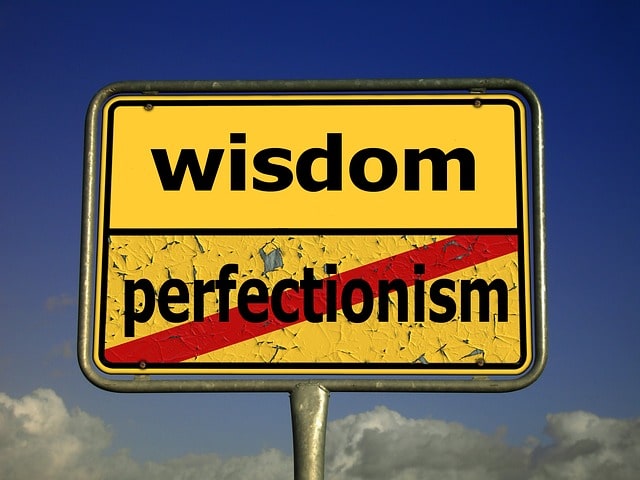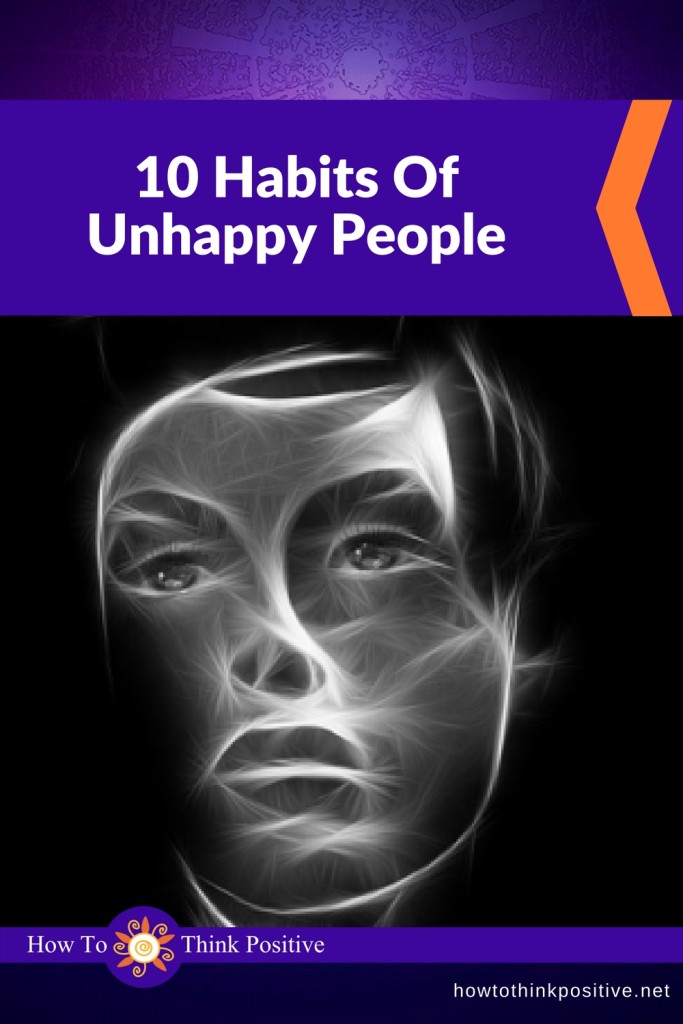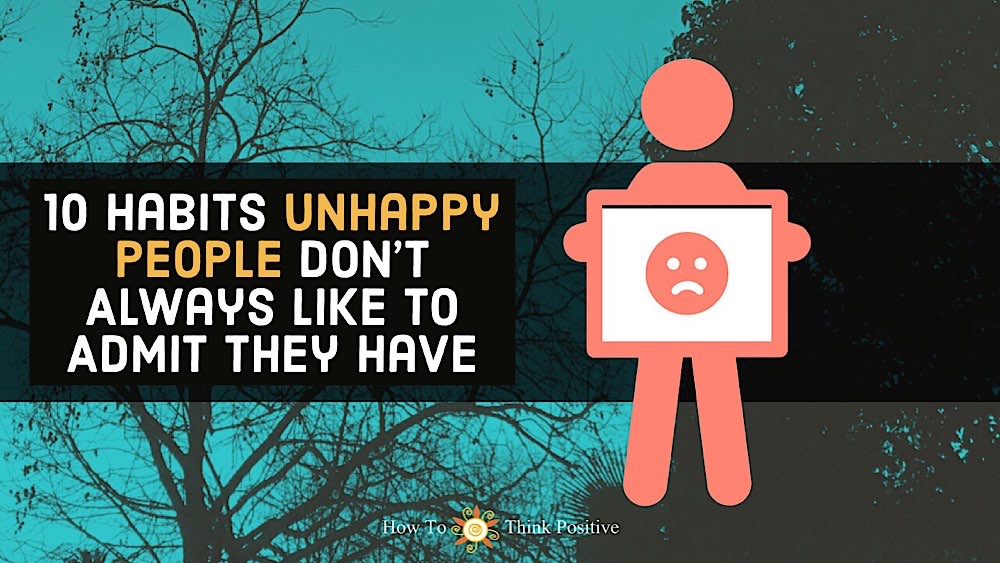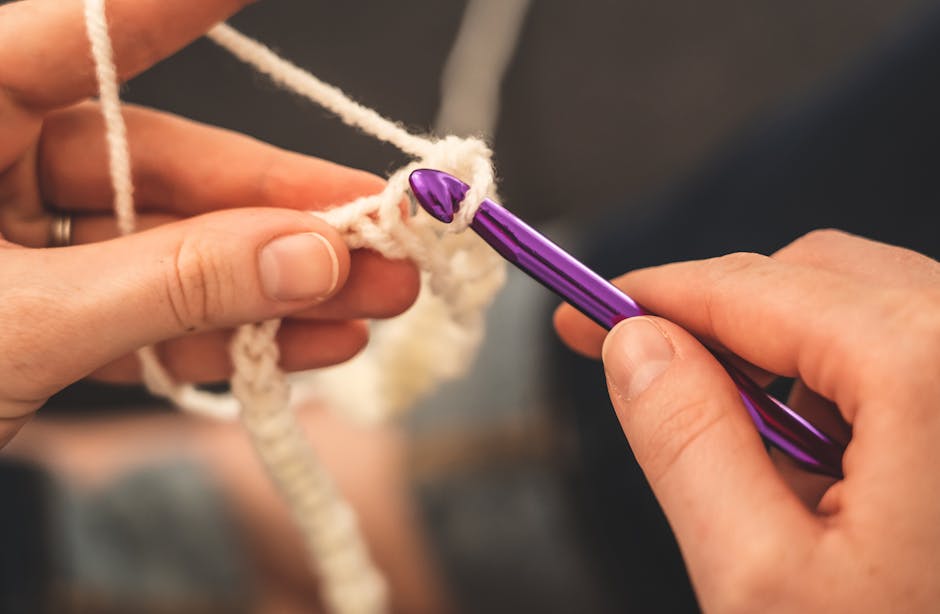Life is more beautiful, meaningful and enjoyable when we are happy. But how come there are so many unhappy people with habits that are not productive at all found at every corner nowadays?
This post contains Amazon affiliate links, meaning I may earn a small commission if you purchase through my links, at no extra cost to you. Note: We aim to provide accurate product links, but some may occasionally expire or become unavailable. If this happens, please search directly on Amazon for the product or a suitable alternative.
From the grumpy neighbor across the street who never says hello, to the bank teller who always looks miserable, thinking he just does this for the money but he would rather be anywhere else but at his job, unhappiness is all around us. If you’re wondering why some people always look happy and truly are while others are so miserable, it’s all in the combination of the way they think, act, and the decisions made in life.

Sure, we all have our bad days when we feel low, but at the end of the day; only you have the power to rise above your circumstances and be happy or spend the rest of your life beating yourself up in misery.
Much of it comes down to your life choices. And of course, when these choices are repeated, they become habits and beliefs that dictate everything in your life.
Here are 10 habits of unhappy people that you should get rid of if you want to create more happiness:
1. The Obsessed Perfectionist

I believe every person is a perfectionist in his or her own right. We all have high expectations of ourselves and dedicate lots of time and effort to achieve them. To this end, perfectionism drives us to go the extra mile to excel in every aspect of our lives, which is a good thing. However, it becomes a big problem when the pursuit of perfection turns into an obsession. This type of “extreme perfectionism” can have adverse effects on both your physical and mental health and prevent you from being your best.
For instance, you’re likely to become less efficient in what you do when you spend way more time fixing errors after completing a task so that the end product can be “perfect.” Initially, this may start off in 10 minutes, but as time goes, you’ll find yourself spending 30 minutes, or an hour more on a task than you intended.
Also, the desire to always be perfect can also make you over-complicate an otherwise simple task to the extent that it becomes subconsciously intimidating to you. As a result, you may find yourself procrastinating as you wait for the “perfect” moment to get it done “perfectly.” This moment may never come until it’s too late.
But most importantly, obsession with perfection can prevent you from being happy. Most often, perfectionists suffer from stress, anxiety, depression, and sometimes they even commit suicide when things don’t turn out as they expected.
So how do you tell if you or someone you know is obsessed with perfection?
Here are 10 signs to look out for unhappy perfectionist people:
1. They often set incredibly high and unrealistic expectations for themselves.
2. They are obsessed with fixing errors.
3. They don’t delegate work to others.
4. They are obsessed with only the perfect end product; not the process.
5. They are not satisfied when they perform well unless it’s 100% perfect.
6. They pay great attention to detail.
7. They are often procrastinators.
8. They often feel inadequate and lack self-confidence.
9. They constantly criticize themselves when they get things wrong, but are very sensitive to criticisms from others.
10. They’re afraid of trying and making mistakes.
If you identify with the above characteristics, these practical tips can help you overcome your perfectionist tendencies to live a healthy and happy life:
Be Okay With Making Mistakes
We live in a real world where failures, mistakes, and imperfections are part of life. The sooner you’ll accept and embrace that fact, the faster you’ll be able to let go of your need for perfection, and the happier you’ll become.

Set A Time Limit
Every work you have will take as long as you want it to take. If you don’t set a time limit for it, you’ll take forever to accomplish it. However, if you give yourself 3 hours to complete it, you’ll be able to do so in 3 hours or less and move on to something else. The great sense of satisfaction that you feel when you successfully complete an assignment or achieve a goal is incomparable.
Focus On The Process, Not The End Results
When you’re 100% attentive to the present moment, you’ll be able to give you best to the task at hand, instead of worrying about the outcome.
Overall, being obsessed with perfection can only lead to disappointments, stress, and unhappiness. So, why waste your time on it? Instead, forgive yourself when you make mistakes, learn from them and be happy, just the way it was intended from the beginning.
Part 2 – They Let The Past Dictate Their Future

This is another major cause of unhappiness in many people’s lives. If you’re constantly thinking about the experiences (both good and bad) you’ve had in the past, there are high chances; this is affecting your current life in lots of areas. It doesn’t matter what you’ve gone through, the past is gone, and there’s nothing you can do to change it. So, never let it determine who you are now or where you are going.
Instead, learn to let go of the things that are out of your control and focus on today. Ask yourself this, “What can I do differently today to change my life for the better?” There must be at least something you can do right this very second that can significantly improve your life. If you’re ready to take action, these simple tips can help you let go of your past so it doesn’t dictate your future:
Let Go Of Your Past Mistakes And Forgive Yourself
Perhaps you’re blaming yourself for letting your self-limiting beliefs hold you back for so long, or regretting something bad you did in the past. You may not realize it, but the truth is, the regrets and self-blame are slowly shaping your future. But you don’t have to let your past failures prevent you from achieving what you want in life. Learn to forgive yourself (and all the people who hurt you) and let go of all those painful memories that you have no control over. You have what it takes to break free from your past so that you can live a happy, healthy and successful life.
Set Small Achievable Goals
If you’ve not been able to achieve one of your big dreams and you’re feeling terrible about it, perhaps you should think about breaking it down into smaller manageable chunks. Setting smaller, achievable goals can help build your confidence, motivate you to keep moving forward, and set you up for success.
Ask For Help
It’s not easy to seek help when you’re at your lowest point, but that’s what you need to do at this very moment. The people who genuinely love and care about you for who you are will always be there for you no matter what, so reach out to them and share what you’ve been going through. I’m sure; they’ll be happy to help you in the best way they can.
Do What Makes You Happy
What better way to break away from all that sadness of being trapped in your past than doing what makes you happy. This could be an activity such as walking your dog, singing, watching a movie, dancing, working out, etc. If possible, find a trusted friend or family member to keep you company. I’m sure you’ll have more fun together than when you are all by yourself.
Be Patient
You have the power to create the life you deserve – a happy, healthy and meaningful life. So, don’t let past regrets, inaction or limiting beliefs prevent you from living that life. Make the necessary changes in your life and be patient, it’s only a matter of time before things change in your favor.
Overall, letting go of the past and living fully in the present is the key to becoming happier with who you’re, what you do and where you’re going.
Part 3 – Hold On To Grudges

All of us have been hurt by either the words or actions of others. Perhaps your best friend criticized your parenting skills in front of your kids, or your current boss is making your life at work unbearable. These wounds can leave lasting feelings of bitterness, anger and even vengeance in your heart. But the good news is that you can choose to embrace forgiveness and move on with your life irrespective of whether the person who wronged you asks for forgiveness or not.
However, this is not always easy for everyone. Unhappy people tend to hold on to grudges because they find it difficult to forgive others. If you’re one of them, harboring ill feelings against someone else may make sense to you considering how much they’ve hurt you. But is it worth jeopardizing your happiness?
Being unforgiving and resentful is like feeding yourself poison, but hoping that some other person will die. You’ll end up hurting yourself and destroying your own life more than whoever you’re trying to get back at.
Here are some of the things that will happen to you when you don’t forgive others their mistakes:
a) You’ll become stressed and depressed – When you hold on to grudges, you’re granting the person who hurt you a constant presence in your life. Constantly keeping them alive in your thoughts means reliving those painful moments that you’d rather forget. The more you think about them, the more you’ll be filled with anger and desire for revenge. Such bitterness can increase your stress levels and heart rate, leaving you vulnerable to various health problems such as high blood pressure, heart disease, etc.
b) You’ll bring that bitterness and anger into every new relationship that you get into. And as you may already know, nothing good can come out of a relationship where there’s no forgiveness.
c) You’ll feel like life lacks purpose or meaning – When you’re so wrapped up in the bad things that others have done to you, you won’t be able to enjoy the present moment and all the beautiful things life has to offer. And of course, when you’re always angry, very few people will want to be around you. Hence you might find yourself losing most of your friends and even some family members.
On the other hand, when you choose to let go of all the feelings of resentment and thoughts of revenge, you’re making way for freedom, peace, and happiness. Note that the act that offended or hurt you may always remain a part of your life, but forgiveness can help lessen its grip on you, allowing you to focus on other positive areas of your life. It can also lead to feelings of empathy, compassion, and understanding for the person who hurt you.
Here are some of the benefits of forgiveness. Hopefully, they’ll inspire you to let go of whatever grudge you’re holding on to right now:
- Greater psychological and spiritual well being
- Stronger and healthier relationships
- Better sleep
- Less stress, anxiety, and hostility
- Stronger immune system
- Improved heart health
- Lower blood pressure
- Higher self-esteem
- Greater work productivity
Overall, forgiveness has been linked to several positive outcomes like peace, happiness, and general well being, so learn to let go of any desire to hold onto old grudges. When you do, I guarantee you that you’ll be much healthier and happier.
Part 4 – Engage In Negative Self-Talk

Would you like it if one of your friends repeatedly told you that “you’re not good enough,” or “you don’t have what it takes to succeed in life,” or “you lack confidence?” Would you consider him or her a real friend? If you said no, then why would you think or talk to yourself the same way? A little self-criticism once in a while can be the reality check that drives you to become a better person. However, when you continuously engage in negative self-talk, it can erode your self-esteem.
Unhappy people tend to criticize themselves on a daily basis not knowing how this habit is detrimental to their overall health and well-being. Self-defeating talk not only crushes your self-confidence and esteem but also diminishes your performance and ultimately sabotages your happiness and success.
If you aren’t sure whether your self-talk is positive or negative, here are some examples to help you identify negative self-talk:
- You automatically anticipate the worst in everything. For instance, when you get to work late because of heavy traffic, you automatically believe the rest of your day will be disastrous.
- You blame yourself automatically when something terrible happens. For instance, an evening out with your friends is canceled and you automatically assume that they don’t want to be around you.
- You always see things as only bad or good; there’s no middle ground. If you or everything you do is not perfect, then you’re a total failure.
- You always filter out all the positive aspects of any situation and magnify on the negative aspects.
Admittedly, this is not the best way to live if you want to be happy in this life. But, the good news is that you can turn your negative thinking into positive thoughts if you’re willing to put the necessary time and effort. Positive thinking has several health benefits including:
- Low levels of stress
- Increased life span
- Better physical and emotional well-being
- Better coping skills during times of stress and hardships
- Reduced risk of dying from cardiovascular diseases
If you’re ready to start thinking positively and enjoy these benefits and much more, these tips can help you silence your inner critic:
Identify Areas That Need Change
The first step to positive thinking is identifying those areas in your life that you constantly think negatively about. This can be your relationship, work, daily commute or self-image. Start small by focusing on a single area in a more positive way.
Surround Yourself With Positive, Supportive People
The people you spend most of your time with can influence you either negatively or positively. This is why it’s important that you only allow positive, supportive people in your life; people who love and accept you for who you are and are dependable at all times.
Live A Healthy Lifestyle
Take good care of yourself by exercising at least 3 times a week to positively affect your mood (among other benefits), eating healthy meals in moderation to fuel your body and mind, and often laughing to reduce stress.
Practice Positive Self-Talk
Instead of constantly being critical of yourself, try to be gentler and more encouraging instead. As a general rule, never say anything to yourself that you can’t tell anyone else. And if you find yourself thinking negatively, evaluate the thought rationally and apply a positive twist to it. For instance, instead of telling yourself, “I have never done it before,” say “It’s a chance for me to learn something new.” With practice and patience, your self-talk with eventually contain less self-criticism and more self-acceptance.
Overall, thinking poorly of yourself is extremely limiting and will get you nowhere. Decide today to let go of your pessimism and constant negative self-talk, and replace them with more thoughts of unconditional love, gratitude, freedom, self-appreciation, and joy. It’s the foundation of a better and brighter reality.
Part 5 – They Keep A Closed Mind »

Life is more exciting and rewarding when you keep an open mind. By this I mean, when you are willing to receive new and different information, especially when it contradicts what’s pre-existing in your mind.
Most of us are raised with a set of values and beliefs that we hold dear to our hearts, and sometimes it can be difficult to be truly open to ideas, experiences, beliefs or opinions that challenge our own. Approaching life in the same old way may feel safe and comfortable, but in the long run, it’s downright boring, frustrating and robs you of your happiness and the opportunity to grow into a better person.
But, at the end of the day, only you have the power to choose whether you want to live this life with a closed mind or an open one. Selecting the latter will expand your intellectual capability and broaden your experiences, making you more interesting and fun to be around. When you embrace open-mindedness you’ll also be able to have:
- Deeper and more meaningful relationships because you’re not quick to draw conclusions about people. When you accept people for who they are, you’ll have a greater ability to love and be loved.
- Less stress because you’re more open to change.
- Better problems solving skills because you’re willing to consider several other ways to deal with an issue.
- More energy to focus on your family, health, work and other important things in your life.
- You’ll also be more tolerant and patient with other people because you’re open to the fact that they may have a valid reason for feeling or behaving the way they do.
- Freedom and happiness – When you let go of your limiting thoughts, you’ll be more open try new, exciting things, which will make your life richer, happier and more meaningful.
Are you ready to take action? Here are some useful tips that can help you cultivate an open mind:
Mix Up Your Routine
Routines are great for bringing stability and order to your life. However, if you want to have a more open mind, you should consider mixing it up once in a while. For instance, instead of going straight home after school or work, try hanging out with your friends or co-workers instead. You’ll be surprised by how fast you’ll start seeing the world in a new, different way.
Broaden Your Horizons
To be more open-minded, you have to be willing to broaden your horizons in any way you can. One of the ways to do so is by educating yourself on other people’s cultures, languages, customs, etc. Being more educated will make you see things differently, besides helping you to be more open to other people’s opinions.
Pick Up A New Hobby
Try a completely new hobby. This can be hiking, karate, yoga or any other activity you don’t know much about and have never thought of trying. This is a great way to meet new, interesting people and expand your social network. The more you interact with different people from different backgrounds, the faster you’ll learn to look at the world in a whole, new way.
All in all, when you can keep an open mind and look objectively at all options in every situation, you’ll open up a whole, new realm of possibilities. Enjoy the energy and vibrancy of your new, colorful world. It’s there for the taking.
Part 6 – Believe Outside Circumstances Are To Blame

We have all seen people who are truly happy – even in the middle of painful life trials (this doesn’t mean that they don’t feel the sadness or grief; they just don’t let it take over their lives). And then there are unhappy people who believe outside circumstances are to blame for their unhappiness. They blame their dysfunctional parents, health challenges, socioeconomic disadvantages, relationship problems and other external factors for their lack of success and happiness.
While it’s true that we go through many challenges in life that cause us undeniable pain and suffering, to blame anyone or anything else but yourself for your unhappiness is casting yourself in the role of the victim.
Pointing fingers at external factors may provide a convenient justification for your poor living conditions, and even exempt you from taking complete charge of your life and well being for a while. However, over time, habitual blaming can lead to resentment, powerlessness, and bitterness, as you suffer from what we call “quiet desperation.”
To make things worse, most of the times the target of your blames either have no idea how you feel or could care less about it. So, you’re only hurting yourself when you blame others because you become a prisoner of your resentment and bitterness. Irrespective of whether your feelings are justified or not, they won’t help you become healthy, successful or happy.
I believe true happiness is what all of us want, so stop blaming others and start taking responsibility for your happiness. You have the power to be happy no matter what you’re going through, so don’t give it away to someone or something else.
If you’re feeling unhappy with your life, you can try some of these tips to make yourself happy again starting this very second:
Appreciate Life More
Instead of sweating the small stuff, develop a child-like sense of wonder and appreciation towards life. Every morning when you wake up, try focus on the good things in your life (instead of the bad) and be grateful for them. For instance, be thankful that you’re alive, you have a home, a job and a beautiful and supportive family who loves you unconditionally. There many people in this world who wish they had families, or a roof over their heads like you, so don’t take anything for granted. Count all your blessings, even the ones that seem trivial.
Forgive
Holding on to grudges will hurt no one else but you, so learn to forgive others for the sake of your happiness and peace of mind. If you make a mistake, take full responsibility, learn from it, forgive yourself and move on with your life.
Create Time To Enjoy Life
Take time off from work to relax, unwind and appreciate the beauty around you. Watch the sun rise and set, smell the roses or take a walk along the beach with a loved one. The past is gone, and the future hasn’t come yet, but you have the present moment, so learn to cherish every second of it.
Choose Your Friends Wisely
Surround yourself with positive, supportive and happy people who share your goals and values. People who help you feel good about yourself, encourage you to achieve your dreams and are there for you when you need a helping hand.
Bottom line: Instead of blaming others for every bad thing that happens to you, start taking full responsibility for your happiness. You’ll be amazed at how fast your life will change for the better.
Part 7 – Are Highly Materialistic

We live in a competitive, individualistic and materialistic society where most people are constantly trying to outdo each other to be perceived as “better.” This starts right from childhood when we throw tantrums when our parents and guardians don’t buy us new and better toys than our neighbors’ children. Unfortunately, this materialism continues into our adult lives most of the times.
Whether it is buying luxurious cars to make us look wealthy, trendy clothes to make us look and feel better, or the latest smartphones to look more modern than our friends, we are constantly looking for something other than what we have. It’s no doubt that a majority of people in the world are stressed and unhappy, but obsessing about material things doesn’t solve the problem; they only make us feel good for a short while.
Perhaps you should try to fast forward your life several years from now when you’re old, ailing and on your death-bed. What will you be grateful for? I can almost guarantee you that when that time comes, it is the happiness that you shared and the memories that you made with the people you love that will make you look back and smile, and not what you owned. Why?
Because material things can’t put their arms around you and assure you that everything will be okay when you are going through a difficult time. Neither can they smile nor laugh with you during happier times. The only thing obsession with material stuff does is to make your life more complicated than it’s already is.
Many people who thought that amassing more money and possessions would make them happier have been greatly disappointed. Instead, they’ve ended up with broken relationships, insecurity, depression, and even suicide.
This leads us to one very important point that you should never forget – you don’t need more material possessions to be happy. You’re perfect just the way you are, and all you need in this life to be happy, you already have. Of course, once in a while, you’re free to treat yourself with the good stuff, but for the most part, you should be happy with what you already.
True happiness lies within you, so don’t waste your time, effort and hard-earned money searching for it in all the wrong places. It just happens when everything in your life falls into place. As you may already know, your thoughts, actions, and choices in life directly affect how you feel. That means that you can’t be happy unless you make the necessary changes on the inside.
Embrace positive thinking and be grateful for what you already have instead of capitalizing on what you lack. Also, invest in relationships with the people who matter to you. Spend more time with them and let them know that you are happy and blessed because of their presence in your life. And, don’t forget to take good care of yourself too; it’s a key component of happiness.
Overall, when you focus on what truly matters, that void you’re trying to fill with unnecessary material possessions will diminish and your life will be much better.
Part 8 – They Complain About Everything

Complaining doesn’t change anyone’s circumstances; actions do. Unfortunately, unhappy people find it easier to complain than to find solutions to their problems. They always have something negative to say, even when everybody around them is happy.
They complain about anything and everything from their spouses, jobs, neighborhoods, appearances, to how little money they make. And their issues are always more important than yours, so don’t expect them to listen to you when you need someone to talk to.
If you’re a chronic complainer, you should realize that this habit is destroying your overall health and well being. Besides making you and the people around you unhappy, constantly complaining about everything also makes you unattractive and drives people away from you.
Also, when nothing in life is satisfying to you, the negativity you feel can increase your stress levels, making you more vulnerable to several health problems such as, headaches, diabetes, high blood pressure and depressions among others.
At the end of the day, only you can choose the kind of life you want to live. Would you rather complain about everything and jeopardize your happiness, or take the necessary steps to change your situation for the better? I strongly believe the latter is better. With that in mind, here are some ways to help you put a stop to your unending complaints, and find happiness:
Change Your Way of Thinking
Chronic complainers tend to think negatively about every situation. If you’re one of them, it’s high time you change your thinking pattern. Instead of always focusing on the negative, try to see the good in people and situations. For instance, instead of complaining about heavy traffic on your way to work, why not be thankful that at least you have a stable job that enables you to provide for your family. There’s always a positive side to every situation; you just need to be willing to see and appreciate it.
Make A List Of The Things You’re Grateful For
When you stop for a minute to see how blessed you’re, you won’t have a reason to complain again. I’m sure there are some amazing people and great things that God has blessed you with. So, make a list of every one of them, and whenever you feel the urge to complain, read them aloud to yourself and be grateful instead.
Identify The Cause of Your Complaint And Do Something About It
Most people complain when something bad happens, but there are others who just love complaining about the sake of it. Find out what’s making you complain and, if possible, do something about it. For instance, if your current job doesn’t make you happy, consider changing jobs or even careers (even if that means going back to school) instead of complaining and doing nothing about it.
Do What Makes You Happy
All that negativity from constantly complaining is not good for you. So, why not do things that bring a smile on your face instead. This can be anything from sports, watching comedies, spending quality time with your friends and family, traveling etc. The key is to find something you truly love doing and do it regularly to increase your happiness.
Bottom line: Chronic complaining will only make your life miserable, so try to seek solutions to the problems you’re complaining about instead. In other words, be the change you want to see in the world.
Part 9 – They Develop a Victim Mentality

Unhappy people also tend to operate from the default position that life is hard and out of their control. They blame any scapegoat (other people, circumstances, fate, and even objects) for their shortcomings and problems and constantly complain about everything. Their hidden agenda is to manipulate and control other people to be responsible for their excuses. According to them, nothing is ever their fault.
The problem with this victim mentality is that it encourages a feeling of powerlessness and helplessness, and when people feel this way, they are less likely to take the necessary actions to make their lives better.
People with a victim mentality may feel some short-term pleasure reliving past events, avoiding taking personal responsibility for their lives, as well as from all the attention and sympathy they receive from those who are concerned about them. But, that is pretty much all they get.
With time, they become off-putting and creepy to those around them. Their negativity, blame game, and stories get old and annoying, and their closest friends and family members begin to feel uncomfortable and manipulated.
Surely, this is not a good way to live if you want a happy and meaningful life. You may have gone through a rough past, but you shouldn’t let it define who you are now, or where you are going. You have complete control over your future; you just have to be willing to take the necessary positive steps to turn your life around.
But before you overcome this destructive mentality, you need to know whether you have it or not. Here are some behaviors of someone with a victim mentality:
- They have “a poor me attitude” and often view others as better, luckier or happier.
- They blame others and don’t take responsibility for their actions.
- They act isolated and helpless to avoid responsibility or discomfort.
- They are pessimistic and negative about everything.
- They believe everyone else has negative intentions for them.
- They feel sorry for themselves, and sometimes tell exaggerated stories to elicit pity and sympathy from others.
- They often reject constructive criticism or efforts to assist them to get past their victim mentality.
- They mainly focus on their problems and complain about them to everyone who cares to listen.
- They exhibit low self-confidence and self-esteem.
- They blame past events for their current circumstances.
If you identify with any of these behaviors, these tips can help you release the victim within you so that you can regain your power:
Awareness – The first step to recovery is, to be honest with yourself and recognize that you have a victim mentality.
Forgiveness – After that, choose to forgive yourself and everybody else who has hurt you in the past. It will help you heal and move past your inner pain.
Responsibility –Don’t let your story serve as an excuse for anything from now on. Be the CEO of your life and take full responsibility for your actions.
Compassion –Shifting from your victim mentality to a new, more positive mindset will take some time, so be loving and patient with yourself as you go through this process.
All in all, having a victim mentality may give you short-term pleasure, but in the long run, it will rob you of your self-confidence, self-esteem and hold you back from living a full, healthy and happy life.
To move past this destructive habit into a state of self-acceptance and self-love, you have to be willing to step out of your comfort zone and take the necessary steps to make your life better. That starts with taking full responsibility for your actions and life, instead of blaming others for every bad thing that happens to you.
Part 10 – They Rely On Others For Their Misery Or Happiness

I’m sure you’ve already heard this before, but I will repeat it anyway – you are the only one responsible for your happiness. Unfortunately, many people depend on others for their happiness, sometimes even without knowing it.
When you find yourself being consumed by the experiences and emotions of others, it only means one thing-you’re emotionally dependent on them. Emotional dependency will pretty much guarantee unhappiness and disappointment for everyone involved.
We, humans, are social beings who are naturally wired to love and care for one another. Because of this deeply ingrained empathy, it can be difficult to be happy when your kids, parents, friends, workmates, or spouse are miserable. After all, it’s only natural to laugh when the people around you are happy and feel sad when they’re going through bad times.
However, this reliance on others is not good for you. You have to learn to find happiness within yourself, irrespective of who is in your life, or what they’re going through. This doesn’t mean you stop caring for them though. It’s more to do with finding the balance between investing in your emotional health and caring for your loved ones.
Note that you may feel guilty for focusing on your happiness first, but remind yourself that you’re doing it for the good of everyone. When you’re truly happy, you’ll be resilient, strong and best equipped to offer support to those around you than when you are not. So, don’t waste your precious time feeling guilty because it won’t help the other person, or improve the situation.
Here’s how you can live a happier, healthier and productive life without letting the words or actions of others affect your life:
Allow Some Quality “Me Time”
Extroverts are naturally more comfortable when surrounded by others, while introverts thrive better on their own. Regardless of your personality, spending quality time by yourself from time to time, will help you unwind, discover more about yourself, and become emotionally strong and independent.
Take Control Of Your Life
Many people who have relied on others for their happiness, or to help them achieve their goals have been greatly disappointed. Constant disappointments often lead to anger, resentment, and unhappiness. Don’t make the same mistake as them. Take total control of your life, and start being responsible for both the good and bad things that happen to you.
Commit to Positivity
Make positivity your way of life by focusing only on things that make you happy. This could be singing, helping others, having a good laugh, or talking to someone. Identifying activities that bring a smile on your face, and making them a part of your life, will bring happiness to your life and make you see the world in a more positive light.
Love Yourself
Love yourself for who you are on the inside and not what others think of you. When you know, love and embrace your unique self, it will be difficult for others to bring you down no matter what they do or say to you.
Overall, changing these negative and destructive habits is a great step towards making yourself and the people around you happy. The habits of unhappy people suck as you may already know by now, so choose today to live happy irrespective of your circumstances.
Conclusion and Resources
As you can see, these are the major archetypes that make people unhappy. Much of it has to do with the program we developed from the time of our childhood up into adulthood.
I think it is greatly the responsibility of the adults in our life on how they influence us when we are young, and eventually how we turn out. But I also believe it becomes OUR responsibility to change it when we become old enough to understand as we become adults.
Use these past examples to look at areas that you may need to work on, and begin to focus not on the problem itself but the solution to change it.
There is no black and white solution to create happiness in our lives. But as we gain more and more awareness, our capability to deal with these increases, as we become more experienced and wise.
Remember that you may not be able to increase your experience as that usually comes with time. But you can increase your awareness and wisdom by ongoing learning. Especially learning from the experiences of others.
Self Improvement Resources
The following are powerful guides that can help you along your personal development journey:
1. Self-Empowerment Awakening »
My personal guide, based on my own personal experience on how I overcame negative thinking and changed my life as a result. This package contains the information and inspiration you need to change your life for the better. Get the best deal from this page. A must-have!
2. How To Develop A Positive Mindset »
If you want to succeed and be happier in life, you must learn how to think positively and cultivate a positive mindset. This will help you with that.
3. How To Change Your Habits »
Step by step, you can transform your bad habits into good ones. Make sure you get this package!
4. A Little Better Every Day »
Step-by-step guide on how to apply a small change approach to your every day life. The results are creating success in business or career, relationships and more.
5. Get Out of The Hole of Negative Thinking and Find Your Ultimate Potential »
My personal guide based on my own personal experience on how I overcame negative thinking and changed my life as a result.
6. The Law of Attraction: A Quick Guide to Your Hidden Manifesting Power »
After hours of research and reading trying to understand the Law of Attraction, I compiled only the most useful lessons I learned, this outlines the understanding of how to make the law of attraction work for you.
Want to get notified on new content?
Get email updates when new posts and articles are available.
» Yes! Sign me up for free updates.
Other recommended to read:
- 10 Tips To Create Positive Change In Your Life
- 5 Habits Of Unhappy People
- The Power Of Positive Thinking Explained Finally
- Self-Empowerment Awakening: The Back Story
- How To Think Positive: The Law of Attraction Book
- Where Negativity Or Positivity In Your Life Starts
- 5 Simple Habits Of Happy Couples
- Top 25 Inspirational Quotes





Unfortunately … without realizing, some people appear to derive some satisfaction from complaining. We all know… that person that always talks about the abuses in life they continue to suffer and you just can’t move them from that focus even if you take different approaches like empathy, silent listening (sounding board), or even just trying to joke to make things lighter. They ‘love’ and seem happy complaining about something, anything. It’s a habit that’s ingrained and second nature. Personally when I catch myself complaining I try not to make it worse by beating myself up for worsening my mood by my own frustrated complaints. I’m not perfect and I try to move on by tuning out what’s bugged me. Reading, meditating, listening to music and even changing directions, if in traffic, helps. After all, situations will always change. When in a better place I’m am grateful, even for my complaining friends and family as they provide the contrast that I learn from about myself. Imho.
Primarily, I think that it’s because they’ve created from all those experiences, an identity of themselves as who they see themselves to be. They are terrified of loosing this identity because after all, who will they be? It’s like a program that has been written in their subconscious mind from all their collective negative experiences. For some people it takes ongoing and consistent re-conditioning of the mind, but Interestingly enough, for many others it takes a traumatic experience that breaks the programming, it shatters the old paradigm, making room for a new one.